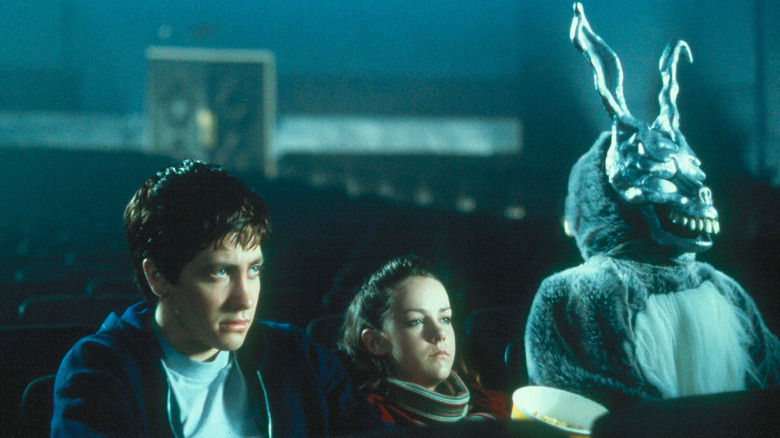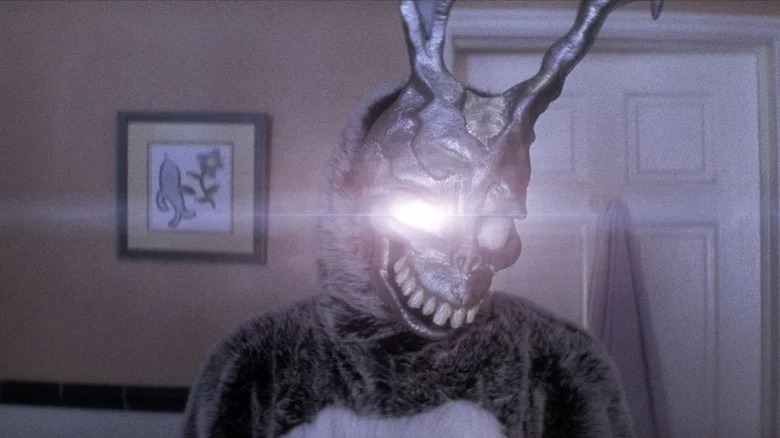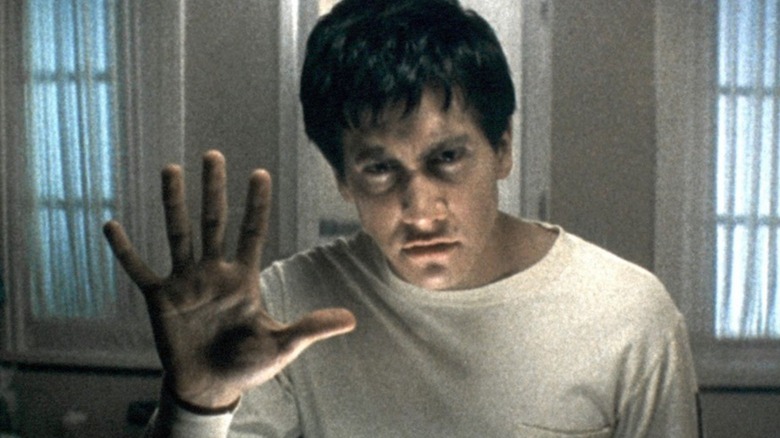How Jake Gyllenhaal Made Donnie Darko's Frank The Rabbit Scenes His Own
Richard Kelly, who was only 25 while directing his genre-hybrid, deliciously ominous "Donnie Darko," had been inspired to pen the screenplay after hearing a news report while growing up in Richmond, Virginia. Per this news report, a chunk of ice had fallen off a plane and crashed into a boy's bedroom (thankfully, the room was empty when the crash occurred). This image haunted Kelly for years, as the incident could symbolize myriad things for the boy who had evaded near death, including questions about the meaning of existence and the concept of deus ex machina. These speculations took shape in the story of Donnie (Jake Gyllenhaal), a troubled boy who narrowly evades death, and goes on to unlock the powers of time travel to prevent the collapse of the primary universe. While being mired in teenage angst and existential dread, Donnie is plagued by visions of a man in a rabbit suit, who plays a seminal role in Donnie's heartbreaking journey.
Gyllenhaal, who had proven his merit in his breakout role in 1999's "October Sky," invested Donnie with the perfect amount of snark, balanced out with a curious, sensitive core hidden beneath layers of emotional armor. Donnie encapsulates the turmoil of adolescence taken to extremes, wherein feelings for a crush assume equal importance as heady, existential questions about the nature of death. Donnie's exchanges with Frank (James Duval), the dude in the rabbit mask, emerge as high points in this evenly baffling, emotionally-charged film, thanks to Gyllenhaal's unique approach to handling this aspect of Donnie's character.
Per The Ringer's oral history of "Donnie Darko," Gyllenhaal made the conscious choice to be creepy during his conversations with Frank, whose presence already evokes a surreal, nightmarish effect that accompanies the countdown to the end of the world. How did he do it?
Countdown to the end of the world
After the opening dinner-table kerfuffle, Donnie is seen sleepwalking and speaking to Frank on his neighbor's golf course in the dead of the night. The setting of the scene is extremely eerie, as the tone shifts from a coming-of-age drama to an unsettling, apocalyptic sci-fi involving otherworldly beings who double as messengers of doom. Frank, ever-menacing, tells Donnie that the world is about to end in a precise amount of time. However, the underlying terror of the scene emerges from the way Donnie responds, his eye hooded and chin angled downwards, perpetually smirking at Frank's ominous prophecy.
Gyllenhaal told People how he had intuitively incorporated this creepy stance while talking to Frank, making every scene he shared with the monstrous man-rabbit his own:
"I remember as an actor making a choice in that scene as to how I talked to the rabbit. That wasn't really scripted. It was the beginning of where I said, 'I'm just gonna throw this and see where it sticks.' And all of a sudden I started looking at the rabbit, my chin down, looking at him in a particular way. And eventually, it became a choice that my character made every time he saw the rabbit."
Gyllenhaal's choice to speak to Frank in this specific manner was so effective, that even Duval, who was acting opposite him in the nightmarish rabbit mask, was creeped out by his " otherworldly intensity." This is especially fitting, given how Donnie is meant to fulfill the trope of the chosen one, the Living Receiver who is meant to be in tune with things that do not hail from his world. Even without this context, the scene is appropriately creepy and sets Donnie apart from the average angsty teen in coming-of-age arcs.
Donnie and Frank's exchanges are the heart of the film
"Donnie Darko" tackles a plethora of themes, some of which are more philosophical than others, pondering possible theories about tangent universes and what it means to be young in a world accelerating towards extinction. Despite the dense implications of Donnie's ultimate sacrifice and the exact mechanics of the worldbuilding, the film is accessible to anyone who finds themself a little too lost in life. The transition from adolescence to adulthood is not a definite, defined process, but these growing pains can often leave lifelong marks. The conversations between Donnie and Frank highlight these fraught anxieties and doubts, which do not necessarily cease to exist with adulthood. On the contrary, they can mutate and fester.
Frank acts like a mirror to Donnie, a subconscious stand-in who pushes the teenager to see beyond social systems meant to restrict personal growth. Throughout the film, Frank urges Donnie to embrace his own demons, which is a necessary evil in the journey of self-exploration. Despite acting like a jerk on occasion, while also being empathetic when the need arises, Donnie comes to terms with his own mortality and understands his purpose as the Living Receiver. He is meant to die for the ones he loves — a devastating, heartbreaking burden — which he carries gracefully in the end. It is the quintessential self-fulfilling prophecy, but in this case, the bearer no longer runs away from his inevitable fate: instead, he embraces it.
Although no one remembers Donnie's sacrifice, they feel it instinctively, like an unconscious need to mourn a brave soul in a mad, mad world. Among them, Frank feels the ache of a ghost wound while staring at his rabbit mask in stunned silence. Donnie Darko will always be remembered.


